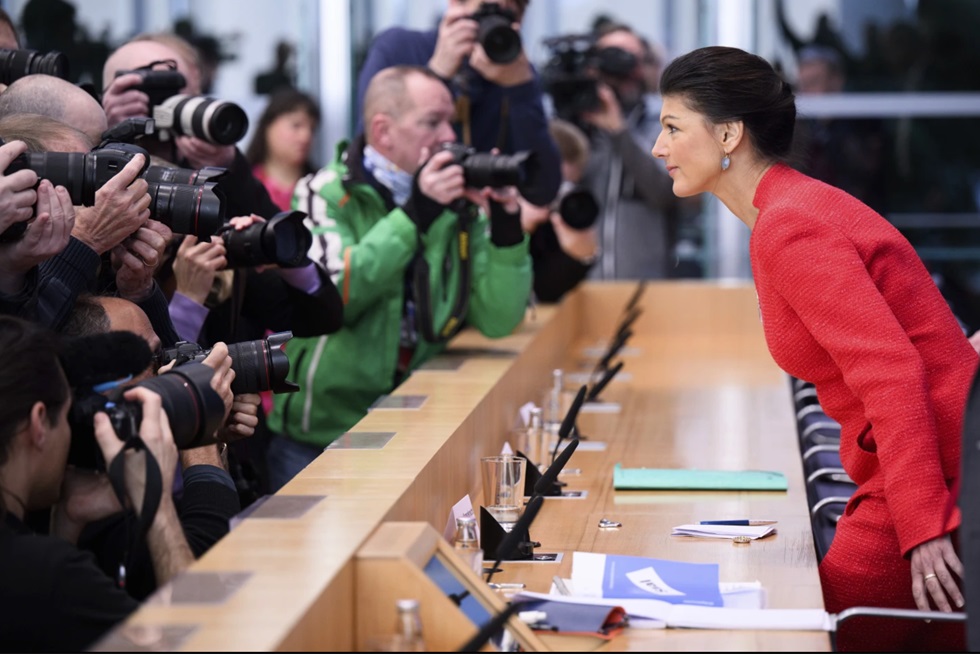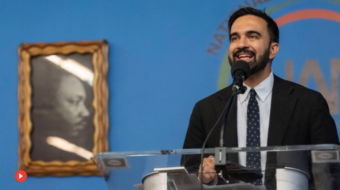
BERLIN – Germany saw the official founding by about 450 delegates, in what was once East Germany’s handsome Cosmos movie theater, of a new party, a break-away from the Linke, the Left. Named “Bündnis Sahra Wagenknecht” (Alliance Sahra Wagenknecht), it will count these delegates its only members until a regular congress is held after the crucial elections to the European Parliament in June.
Support will be welcomed but applications restricted until then, it was explained, so as to prevent undesirable connivers or crazies from disrupting the party’s early development in all sixteen German states. Co-chairing it in these early months, together with Wagenknecht herself, will be the former co-chair of the Linke caucus in the Bundestag, Amira Mohamed Ali (despite her noteworthy name and Egyptian father a life long Hamburg resident. Here is the rationale for the split issued by the new party:
“Time and time again, we have argued that false priorities and a lack of focus on social justice and peace dilute the party’s profile. Again and again we have tried to stop its decline… We didn’t succeed…The history of the Linke since the 2019 European elections is the story of political failure.
“The party leaders and the functionaries supporting them at the state level were determined not to discuss this failure critically under any circumstances. They did not take responsibility for it, nor did they draw any substantive conclusions from it.
“Rather, those who were critical of the course of the party leadership were blamed as the culprits for the results and were increasingly marginalized. Against this background we no longer see any place for our positions in the party.
“As an example, it is worth remembering our “Uprising for Peace” in February 2023, the largest peace rally in the last 20 years….The entire political establishment of the country defamed the rally. But instead of supporting us against these attacks the party leadership of the Linke stood shoulder to shoulder with those other parties; they accused the initiators of the rally of being ‘open to right-wingers’ and thus provided cues for the accusations against us.
“German foreign policy offers ammunition for wars instead of seeking peace solutions. Conflicts are escalating internationally, the looming bloc formation is a threat to world peace and will bring massive economic upheavals with it …It is the government’s inability to deal with the crises of our time and the narrowing of the accepted corridor of opinion which have swept the AfD (extreme right wing party polling more than the others although nowhere near a majority of voters) to the top.
“Many people simply don’t know any other way to articulate their protest. In this situation, the Linke no longer appears as a clearly recognizable opposition, but rather as a mild ‘Yes, but…’ party. … At the moment, there is every indication that it will no longer be seated in the next Bundestag, while the AfD is polling at over 20 percent. We have a responsibility to resume the battle in earnest for the future of our country. To this end, we want to build a new political force, a democratic voice for social justice, peace, reason and freedom.
“We are leaving our old party without rancor or resentment. For us, the conflict has ended. To all of you we say: We want to separate like adults. A War of the Roses would harm us all. The Linke is not our political opponent. To all those of you with whom we have worked together in a spirit of trust for many years, we also say: We are ready for talks and would be happy to welcome you into our party at an appropriate time.”
The most immediate result of the break was the loss of any left-wing presence on the level of a fraction (like a caucus) in the Bundestag (the German parliament). Twenty-nine members are needed to be a fraction. Since the Linke now has only 28 members and the newly-formed Wagenknecht party only ten they have been demoted to the status of “groups.”
Instead of a regular bloc in the Bundestag, with two front row chairs, both new groups have been demoted to seats way in the far upper back (next to each other), without even desk trays but only their knees to support notes or papers. Their finances and privileges are cut, including their time to speak at the front lectern, their positions in committees and their ability to ask questions of the various ministers. All is shortened or weakened at least until the next elections, planned for 2026, when they must both try to reach the 5% level and achieve status as full fractions.
Will that be possible – and how does the new party stand on the most complicated questions of the day? Its finance and foreign policy expert Fabio de Masi, 43, (whose grandfather was a partisan in Italy), was chosen as top candidate for the European Parliament. In an interview he offered some answers:
First, he rejected charges that the new party was a “Putin lover” party. “I believe that talking with one another is part of the business of politics…Saudi Arabia waged a bloody war against Yemen, where hundreds of thousands were killed. But there are talks with its leader. And all the wars fought by the West in violation of international law ended with negotiations.… Scholz need not agree with everything Putin says, but he must talk with him. Mr. Zelensky’s negotiator has confirmed that talks in Istanbul in March 2022 came very close to reaching a political solution with the Russians, whose basic worry was about Ukrainian membership in NATO. I am convinced that it would have been possible to avoid this war. The war violates international law and is a crime – but what really matters is that it must be ended as quickly as possible.”
Asked how the new party can prevent disappointed AfD members from joining up and moving it to the right, De Masi stated that this is exactly why it was restricting itself at the start to only 450 members. “For example, we clearly do not want anybody who is a racist. But as for those voters who once voted SPD (the Social Democrats) or Linke and then voted AfD, I would prefer that they gather instead behind a democratic force like our party in order to solve their problems.”
A major criticism of Wagenkecht’s position involves immigration. On this, de Masi said: “We must reduce the attractions which cause so many people to come here so as to achieve a better economic future. If these people remain here for a long time without any genuine perspective then that increases social pressures in housing and schools. This has nothing to do with their not being ‘biological Germans,’ as the racists claim.
“Those affected are our people, who once came here from Turkey and who built up our country. It is they who feel the pressures of immigration while those in prosperous neighborhoods feel them hardly at all. The basic right of asylum is valid for everyone who is politically persecuted.
Want more assistance to countries of origin
“But that does not mean that it must be granted by Germany alone. We should offer more assistance to people in their countries of origin while reducing financial subsidies for those who have no claim on protection here. But for those who have a legal basis for coming to Germany we must offer the best chances for successful integration. We must do much more for language courses, kindergartens, trade courses.”
Asked about the name of the party, and how to prevent it from being a pure Wagenknecht show, he said that with no million-euro donations for PR campaigns from big corporations it was necessary to use a name which was widely known. That applied for Sahra Wagenknecht. He said thiswould be changed, at the latest. after the Bundestag elections in 2026.
There have been questions among leftists about a seeming lack of militancy in the new party’s statements, about Wagenknecht’s stated goal of regaining “German prosperity,” as in earlier post-war years, her stress on small enterprise and middle-class welfare with less mention of the role of NATO and the forces behind it. Was this a down-scaling aimed at winning middle-of-the-road-voters? If so, was it a smart policy?
Indeed, one militant section of the Linke, the group (or fraction) called Communist Platform, which always led in opposing a liberal drift of the party, especially a weakening of its opposition to NATO and to sending German weapons – or soldiers – into foreign conflicts, has called it a mistake to break away. They say the party should be maintained – but must be altered.
In an open letter to the Linke co-chairpersons it warned about some in the remaining party who think that now, with those “super-leftist Wagenknecht trouble-makers” finally pushed out, they can make life in the party miserable enough for any remaining Marxist-oriented comrades so they will leave as well.
“Such people may not say so openly,” the new party said in its statement, “but they say them! That is certain! But they have no idea about the views of grass root party members. If they now succeed in impelling comrades from the Communist Platform or “Cuba Si” to also quit the Linke, the consequences are all too predictable. We advise you to call such people to order and to common sense. A failure to do so would mean the end of the party.”
What will now occur? Can the Linke survive? Or will the Sahra Wagenknecht Alliance replace it as the only genuine opposition party of any consequence in Germany?
It is already surpassing LINKE in most of the polls. Nationally, it has reached the crucial 5% level and on some days even touching 7%, while the Linke is sinking, sometimes to a low of 2%.
The Wagenknecht party has taken a percentage lead ahead of the Linke in all three East German states which vote in September. The first big test will be in June with the vote for the European Parliament. Will these two parties become rivals, each weakening the other? Will one prevail?
And if her party is perceived as a danger will the media cease inviting, even flattering Wagenknecht but rather smear her? Some have already begun!
Is it possible that the two left parties will not fight but complement each other? Or will both collapse? The next months may be dramatic, indeed crucial, for German leftist growth and pressure has often been extremely important, not only in its home country but as a central force in all of Europe.
What is now dreadfully needed is such a leftist force– if possible combining with the sincere crowds now devoted to repulsing the AfD and other fascists – to build up a barrier and slow down or halt the menacingly rapacious drive of the billionaires, generals and their politicians toward bigger and more murderous armed forces and a closer and more alarming confrontation with its victims and its foes?
We hope you appreciated this article. At People’s World, we believe news and information should be free and accessible to all, but we need your help. Our journalism is free of corporate influence and paywalls because we are totally reader-supported. Only you, our readers and supporters, make this possible. If you enjoy reading People’s World and the stories we bring you, please support our work by donating or becoming a monthly sustainer today. Thank you!










